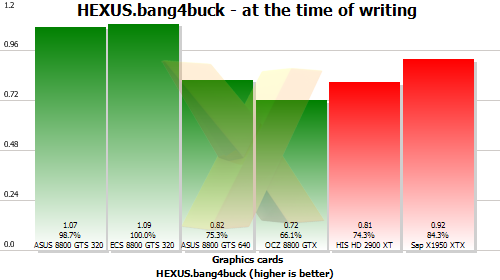HEXUS.bang4buck and overclocking
HEXUS.bang4buck
In a rough-and-ready assessment of the card's bang per buck, we've aggregated the average 1920x1200 4xAA 8xAF framerates for the three games, normalised them*, and listed the cards' price. There are more provisos than I care to shake a stick at. We could have chosen three different games, the cards' prices could have been derived from other sources and pricing is such that it can fluctuate daily. However, to reiterate, the graph below highlights a metric that should only be used as a yardstick for evaluating comparative performance with price factored in. Other architectural benefits are not covered, obviously.| Graphics Cards | ASUS EN8800GTS/HTDP/320 320MiB | ECS GeForce 8800 GTS 320MiB | ASUS EN8800GTS/HTDP/640M 640MiB | OCZ GeForce 8800 GTX 768MiB | HIS Radeon HD 2900 XT 512MiB | Sapphire Radeon X1950 XTX 512MiB |
|---|---|---|---|---|---|---|
| Actual aggregate marks at 1920x1200 4xAA 8x(16x)AF | 231.94 | 221.12 | 238.63 | 329.85 | 222.74 | 232.12 |
| Normalised aggregate marks at 1920x1200 4xAA 8x(16x)AF | 205.94 | 195.63 | 209.31 | 254.92 | 201.26 | 206.06 |
| Price - at time of writing | £192 | £180 | £256 | £355 | £249 | £225 |
| HEXUS.bang4buck score | 1.073 | 1.087 | 0.818 | 0.718 | 0.808 | 0.916 |
| Acceptable framerate (60FPS av.) at 1920x1200 4xAA 8xAF | Yes | No (SC, drivers) | Yes | Yes | No (FC) | Yes |
* - The normalisation refers to taking playable framerate into account. Should a card benchmark at over 60FPS in any one game, the extra FPS counts as half. Similarly, should a card benchmark lower, say at 40FPS, we deduct half the difference from its average framerate and the desired 60FPS, giving it a bang4buck score of 30 marks. The minimum framerate, then, can be 20FPS, as that will score 0.
As an example, should a card score 120FPS we count it as 90FPS (120 - (120-60)/2) as only half the framerate above 60FPS is counted for the bang4buck. Similarly, should it score 30FPS we count it as only 15FPS (30 + (30-60)/2).
The reasoning behind such calculation lies with playable framerates. Should card A score 110FPS in a benchmark and card B 160, then card B would normally receive an extra 50 marks in our bang4buck assessment, even though both cards produce perfectly playable framerates and anything above 60FPS is a bonus and not a necessity for most. However, the bang4buck total would be identical if in another benchmark card A scored a smooth 70FPS and card B an unplayable 20FPS, as both aggregate to 180 marks, yet the games-playing experience would be vastly different. You would, on balance, say that card A was better because it ran smoothly in both games. In our revised aggregation, card A would receive 150 marks (85 + 65) and card B 100 (100 + 0).
In effect, we're including a desired average framerate, in this case 60, and penalising lower performance whilst giving higher-than 60FPS framerates half as much credit as the framerate up to 60FPS. If that doesn't make sense or you have issue with it, please hit the HEXUS community.
Analysis

The graph displays normalised FPS divided by price.
Considered on a pure framerate basis, the ASUS GeForce 8800 GTS 320 offers an attractive HEXUS.bang4buck, providing decent average framerates for the asking price of around £190. The ECS GeForce 8800 GTS 320's HEXUS.bang4buck is derived from using an older driver set, and had we used same drivers as the ASUS card its HEXUS.bang4buck would have even higher, thanks to a lower online price.
We like the fact that the ASUS card managed to average over 60FPS in each of our FPS titles when set to 1920x1200 4xAA 8/16xAF, as well.
Overclocking
We managed to raise the stock frequencies of 513/1584 to 615/1862 without any difficulty. That's around average for the SKU, to put it into some kind of perspective.SC:CT was rerun at the 1920x1200 HDR setting to see how much extra performance the overclocked card offered.

The overclocked frequencies add almost 20 per cent extra to framerates and brings it almost to HIS Radeon HD 2900 XT levels.
Under load the card ran at 63°C. That, again, is average for a GeForce 8800 GTS 320.
[advert]









